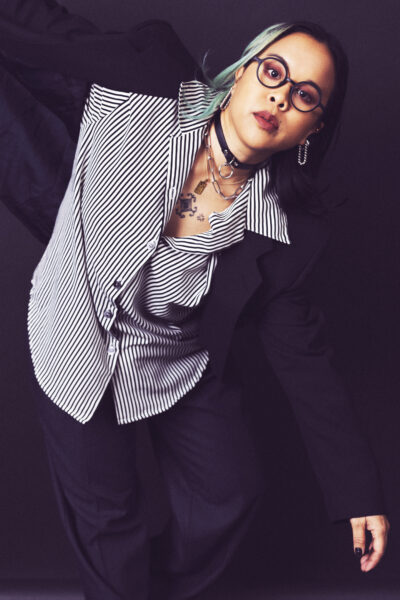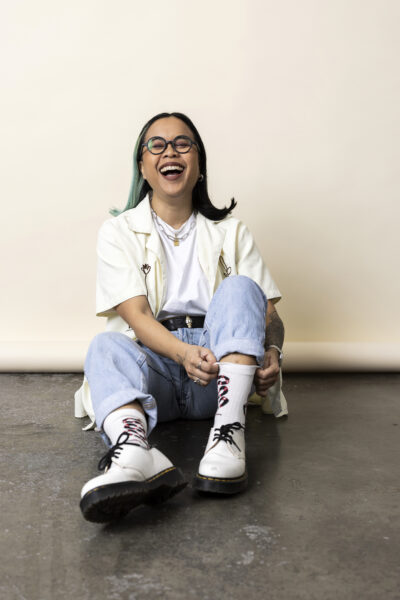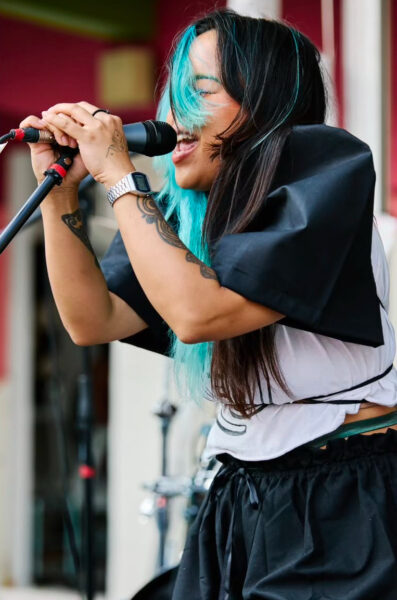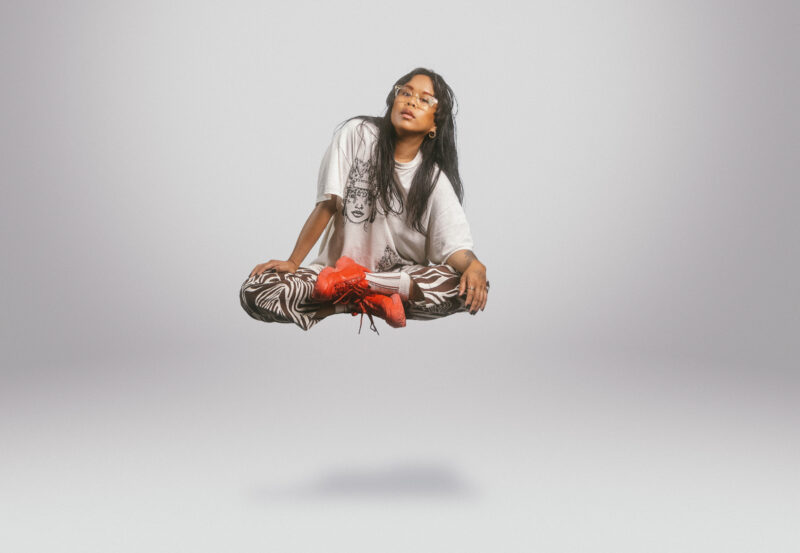Ilo Toerkell: Kimmortal, what are some of your first musical memories?
Kimmortal: When I was a kid, I would accompany my sister to church where she sang, and I just danced beside her, making up moves. It was very cute. Those were some of my earliest musical memories, I think. For a long time, I thought I couldn’t sing because I have this low voice, the alto type of voice, and as a teenager, I loved listening to pop like Spice Girls, Backstreet Boys and Brandy and Monica. I wrote my first song taking lyrics from their songs and making up a tune based on them.
Coming from that background of Church music and then pop, how did you get into rap?

Photo by Kortney Gloska
My cousin first introduced me to “Changes” by Tupac when I was 12. That song made me fall in love. From that moment on, I listened to a lot of hip hop. The ability to squish so many words and so much knowledge into a few bars has always fascinated me. At the same time, I was journaling a lot and eventually started writing and performing spoken word. I started rapping my journal entries while strumming rhythmically on guitar inspired by Lauryn Hill or early K-os. For me, words have always had a musicality and rhythm to them.
Does your musical upbringing, like the memories from church that you described, still hold space in your creative universe at the moment?
In some way maybe. I left church a long time ago, and in my twenties, I was very much anti-church and still am, but I have also now processed a bit more. Filipinos were colonized by the Spanish, endured Japanese occupation and continue under American imperialism and the colonial tool of religious indoctrination has made us think we must submit and are powerless to it.
Reclaiming my power as a Filipinx has happened through me making music: telling my story, performing for the spirits, in service of resistance, sampling the sounds of the water, connecting with ppl who resonate with my vibes – these have all been ways I find my spirituality in musical practise. It gave me an awareness of music as another space and place I can channel the depths of me and activate my spirit. Music is a ritual and a ceremony to me.
This Is My World
Your recent release sunniest of days, musically diverges from the previous record Shoebox. It has more of a jazzy and lo-fi hip-hop sound to it. Also lyrically, Shoebox was about what you called “ancestral intelligence” and journals that process of channeling ancestry and understanding it in the context of the current neo-colonial capitalist structures, whereas sunniest of days is more introspective. What was your journey from the one record to the other like?
I wrote Shoebox during the pandemic. It is literally a shoebox of memories to me. There are songs about intergenerational trauma (“Run”) and healing the inner child. I sample my mother saying “This is my world. I am safe here.” – something she said when looking at a photo of me. There is also a Claymation music vid animated by NoFac3 which is a playful but sexy visual to my song “This Dyke”. At the same time, Shoebox refers to the depressing shoebox that most of us were living in during the pandemic. I was confronted with my triggers at home cos I was not able to run away in lockdown – so I started working with clay and scribbling to heal my burn out and get back to my inner child.
During the early pandemic, I worked with a lot of artists remotely in Zoom-based collaborations. This new EP I recorded drafts of songs in my kitchen and then asked local Vancouver artists who have a more jazz background to come into studio – musicians Matt Yang (keys), Feven Kidane (bass, trumpet) and Miles Wong (drummer, co producer) really shaped the sound of “I just wanna know” for example which is gorgeous.
Using Your Platform
Ahead of sunniest of days, you released the single “Stop Business As Usual” – one version that is just you, and for an updated version, rapper Bobby Sanchez and sound artist Phoenix Pagliacci joined you. The song explicitly talks about the genocide in Palestine that is still going on, and with the collaborative version, you connect that to international fights against injustice and colonial power structures. Can you talk a bit about that song?
I wrote “Stop Business As Usual” in October 2023, shortly after the world began witnessing the genocide in Gaza. It seems like there was and is a mass awakening to what is happening in Palestine. I also learned a lot in that period and had to process it in a song, which also calls attention to the situation. It is also about using your platform as an artist. The song reemerged as a collaborative track because it resonated with so many. I reworked the song with Phoenix, a queer Black artist based in Toronto, who is an amazing rapper songstress and activist – she called attention to Congo, Sudan and Haiti in her verse. Bobby Sanchez also laid down a verse…she is a trans two spirit rapper and poet of Ayacucho ancestry and she calls attention to Peru. I think it is important that the song is not in isolation but grows with the perspectives of collaborators, who also speak up against injustice.
That song, like much of your work, takes an explicit political stance and the oppressive power structures in society. What was your process like of gaining awareness of those and politicizing yourself and your art?
It was a bit of both. Growing up and seeing my parents always having to fight for themselves at work and within these structures gave me an awareness of the unjust systems of power, even as a young person. I remember my mother juggling two jobs, and my father, who worked as a janitor, wanting to write complaints to his boss, but because his English was not so good, my sister and I would help him. We always saw Filipino immigrants in Canada having to advocate and fend for themselves.

Photo by Kortney Gloska
From a young age, I had this basic awareness and critical perspective of working class exploitation, which I then expanded on by learning about societal structures and decolonizing. Of course, it is also still a constant learning and expanding for me. Those are things that move me and shape everything I do. In the end, it is also about love. I am really thinking about questions like how do I love? How do I love as a queer and Brown person? And how can I practice love as liberation?
Absolutely. I think love, understood and practiced outside what the capitalist framework tells us, means decolonizing and liberation, and encompasses mutual care – not just for each other, but also for the land and everything surrounding us. I want to come back to your music and your recent release sunniest of days, which is about that dichotomy of seeing the world in flames, so much injustice and violence happening, while also experiencing the joy of a sunny day. How do you navigate that tension, and does music help?
It is something that I have been thinking about a lot. sunniest of days is about sitting with layers of emotions during a time when there is so much heaviness, grief, and sadness, but there are also days when the sun is out, and you are happy and joyful. Like, I am enjoying my music and feeling in love in my relationships, while at the same time, there is what’s happening in Palestine, there are constant ICE raids, and so much more going on. That is a reality that I want to sit with and create an access point to, which, instead of paralyzing us, can bring us places we need to be. I want to quote Andrea Gibson, a queer poet who recently passed. They wrote: “You fear you are not strong enough to do the hardest thing, only because you don’t yet know that the hardest thing is exactly what will help you know your strength.” That is what I want to do in my music, too – to get to that point of strength.
Music can convey things that we cannot find words for. It is a magical point when that feeling kicks in, and it represents exactly how you feel. For me, making music is also a way of connecting things and emotion, and it allows me to go all the way back and process what was felt in the past. Music is what I always want to be in. But colonial capitalist systems interrupt that flow. How can we then create third spaces to maintain that connection and awareness that makes us thrive in music?
Make the Revolution Irresistible
Like you said, music has been capitalized on and incorporated into the system. Have you found ways to navigate the music industry that is so rooted in this colonial capitalist system?
I am beginning to understand this terminology of being a working-class musician via my friend Ashley Au who wrote an article on The Walrus called “Am I being priced out of music”? It made me think about how I am not a musician that has access to intergenerational wealth – my message has been received by the community and my success and sustenance has been community fuelled. I am dependent on live shows which has been a large part of paying my bills but which are an unstable gig. Touring for example is so financially draining. I have been dependent on grants to keep me afloat outside of covering contract based artists/mgmt. I’ve had to learn how to navigate interpersonal struggles and financial trauma while trying to stay true to my values.
This industry also expects you to not just make music, but be engaged in every single social media platform to depict your person to your crowds. I try to keep it real and be myself but it truly is exhausting. It feels like you are supposed to be a productivity machine pumping out bangers. It is hard. I try to navigate this all by making bangers that do interrupt something or subvert.
You also rap about wanting to reflect the times and using radical imagination. What do those things mean to you, and how have they shaped your understanding of yourself as an artist?
Nina Simone said, I want to reflect the times. So, I credit that line to her. It is Black women, artists, and activists who shaped my understanding of radical imagination. Another influential writer, Toni Cade Bambara, said, Make the revolution irresistible – and I heard that quote through adrienne maree brown’s book “pleasure activism”. Learning about the Black Liberation Movement and indigenous liberation has been an entry point to relating to my own ancestry and the way I exist, and what kind of spaces I strive to be in. Radical imagination is hard for me to explain. I think, i just am it and do it. It is knowing that imagining futures holds transformative power.
To close on a personal note: Is there currently something you have been experimenting with or someone who inspires you?
Absolutely. My homie introduced me to Juliana Huxtable, who is a multifaceted, brilliant genius sound artist. We watched a film of her mixing dope drums and sparse synths on 4 cd-djs! It made me think of how an artist can fill a room and transport you. Right now, I am experimenting with sampling on stage. Outside of just doing vocals, I’m using a Roland SP-404. It’s like a sacred box. It has the sound of the water from my dad’s homeland in the Philippines, it has my mom’s quote “this is my world, I am safe here”, and it has a funny laugh track from Filipino TV shows. I can trigger it and add delays whenever I want to on stage, and it allows me to fill the room with this obnoxious funny laugh. I am really loving that process at the moment and maybe helping people laugh.
sunniest of days by Kimmortal is out now via Odd Doll Records. You can stay in touch with Kimmortal via their Instagram and website.
Catch Kimmortal live in Berlin and at Reeperbahn Festival in Hamburg this September.



